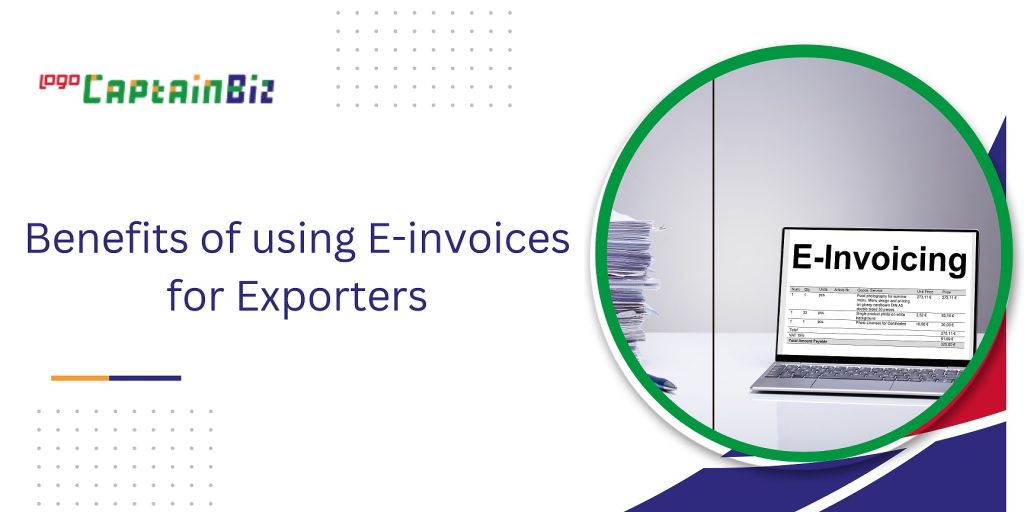Cross-border transactions have emerged as a critical component of international trade, enabling the transfer of commodities and services between countries in an increasingly interconnected globe. It can be challenging for exporters to navigate the intricate laws governing international trade and GST compliance. However, E-invoicing is about to revolutionise the game.
This digital revolution is gaining ground quickly, reducing the frequently complex process of cross-border transactions and making it easier for exporters to comply with tax laws. The global E-invoicing market is anticipated to reach $35.9 billion by 2028. With these significant figures, it’s evident that E-invoice for exporters is a game-changing instrument that is revolutionising global trade, not only a fad.
What is an E-invoice?
E-invoicing is the digital process of creating, sending, receiving, and processing invoices between businesses (B2B). This new electronic approach allows for technological and automated innovation by replacing the traditional paper-based or digital invoicing system with an organised electronic format.
E-invoicing is becoming more and more commonplace due to its many advantages, which include improved security, efficiency, accuracy, and transparency. More and more governments require or reward companies to use electronic invoicing to prevent tax evasion and advance digitization.
What is an E-invoice Compliance?
E-invoicing compliance is the act of suppliers and purchasers adhering to legal requirements when exchanging electronic invoices. E-invoicing compliance usually centres around these four requirements:
- Understanding your trading partners to ensure product authenticity
- guaranteeing the accuracy of documents
- Providing documents in a readable format is known as readability.
- Storage and document retention for tax audit purposes
Understanding the tax compliance standards for invoices is another necessary step in providing a compliant E-invoicing solution. Local laws specify what needs to be included in an invoice, and these criteria vary by nation.
Depending on where an invoice is issued, requirements change. Regulations have changed, and new government restrictions have rendered compliance with E-invoicing equal to compliance with tax laws.
E-invoice Compliance for Exporters
Exporters must comply with E-invoicing to guarantee seamless international trade. Essential elements comprise:
- Validity and Authentication: To be accepted globally, E-invoices must be digitally authenticated and legally valid.
- Invoice Data Requirements: These are required to comply with specific invoice data requirements, which include correct product descriptions, the date of the invoice, the buyer and seller’s details, and the currency. Accurate data is essential for cross-border transactions.
- Digital Signatures: E-invoices frequently call for digital signatures to authenticate the document’s authorship and integrity and to reassure the recipient that it was not altered in transit.
Avoid common blunders such as using a bogus digital signature, entering incorrect or missing invoice data, and ignoring destination country local compliance rules. Severe consequences for non-compliance include penalties, payment processing delays, and even possible legal action. Exporters must carefully follow E-invoicing compliance guidelines to protect their export business and lower the possibility of mistakes and fines in global trade.
Why does Global Compliance matter?
A significant business difficulty for companies with global operations is ensuring global regulatory compliance with worldwide tax and invoicing regulations. Countries differ significantly in the regulations about the receipt and sending of invoices and tax compliance; in reality, your organisation must comprehend and handle all local and international obligations.
Due to the complexity, fragmentation, and rapid change associated with compliance in these areas, you require an experienced partner with a thorough awareness of current worldwide developments.
What is the Importance of CTC and E-invoicing Compliance in your Business?
Complying with local E-invoicing laws was already tricky for multinational organisations, and implementing CTCs makes it even more difficult. Nevertheless, compliance with the rules is crucial. Correctly managing VAT and other taxes not only lowers the possibility of penalties but also guarantees that businesses can complete VAT returns accurately, on time, and with minimal administrative effort.
It means a steady and dependable revenue collection for governments and tax authorities, which helps to guarantee enough money for the public sector and other government projects.
How to Simplify Tax Compliance for Cross-border Transactions with E-invoice?
Technological developments have entirely changed the realm of indirect tax compliance by providing creative solutions that increase accuracy, streamline procedures, and boost company productivity. Significant technical developments for indirect tax compliance include the following:
- Automated Tax Calculation and Invoicing: Using the applicable tax rates and regulations, contemporary accounting and invoicing software may automatically determine the correct amount of indirect taxes. Automating invoices lowers the risk of human error and guarantees precise tax billing for every transaction.
- Real-Time Transaction Monitoring: Businesses may now keep an eye on transactions in real time due to advanced technologies. Because it enables businesses to continuously track input and output tax amounts, improving accuracy and compliance, this feature is beneficial for VAT and GST compliance.
- E-invoicing and E-archiving Solutions: Standardised electronic invoice creation, sending, and receiving are made possible by E-invoicing systems for enterprises. E-archiving systems also assist with the electronic storage and management of tax-related documents, such as invoices, making it easier to retrieve them in the event of an audit.
- Artificial Intelligence and Machine Learning for Tax Data Analysis: These technologies are capable of analysing large volumes of transactional data, finding trends, and spotting abnormalities. These features help tax experts ensure tax compliance and conduct thorough tax audits.
- Integration of Tax Compliance Software: Enterprise Resource Planning (ERP) systems, which incorporate tax compliance modules, are utilised by numerous firms. These systems facilitate smooth tax compliance by automatically calculating taxes, updating tax rates, and producing tax reports.
- Digital Tax Reporting and Filing: Systems for digital tax reporting and filing are becoming more and more popular among governments. Companies now have the option to file their tax forms, which streamlines electronically, speeds up, and reduces the possibility of errors. This facilitates the efficient processing and validation of data by tax authorities.
- Cross-Border Tax Compliance Solutions: Trade with other countries has intricate tax ramifications. Emerging technological solutions have made it easier for firms to comply with export laws, import taxes, and customs fees while managing cross-border tax compliance.
- Blockchain Technology for Supply Chain and Tax Traceability: With its transparent and unchangeable record, blockchain technology makes it possible to track transactions across the supply chain precisely. Businesses can use this to expedite tax compliance activities and confirm the accuracy of tax-related information.
In general, technology advancements in indirect tax compliance have significantly increased the precision and effectiveness of tax-related procedures for companies, allowing them to concentrate on their core competencies while adhering to constantly changing tax laws.
What are the Benefits of using E-invoices for Exporters?

As digital methods become more widely used, here are the benefits of E-invoice for exporters in the following ways:
Seamless Reconciliation of Accounts
To decrease data entry and mismatch errors, E-invoicing can aid in filling the gap in data reconciliation. Additionally, real-time tracking of supplier-prepared bills will be possible, reducing the need for tax authorities to conduct audits because the necessary information will be accessible at the transactional level.
The primary goal of the tax department is to make it possible for GST returns to be pre-populated, which will lessen issues with reconciliation. Following the implementation of E-invoicing, there is no need for new data entry because the information from the invoices may be pre-populated into the pertinent tables of the tax returns.
Less Compliance Burden
Information flows to the e-way bill and GSN systems since the systems are interconnected, which will eventually decrease compliance. As invoices are continuously uploaded, most information will already be in the return. All you have to do is file the return, validate, and include the supplementary details (B2C).
Lowering Duplicate Invoices
As per the latest State of Tax Justice report, India is losing over Rs 75,000 crore due to tax malpractice worldwide. The quantity of fake or duplicate invoices has grown due to suppliers’ reluctance to digitise their bills, resulting in tax fraud.
By monitoring fictitious invoices issued and guaranteeing that tax authorities have access to a single database, implementing an E-invoice method can assist in reducing tax evasion and promote tax compliance.
Quick Access to Legitimate Input Tax Credits
Input tax credit under- or over-claims are frequently the result of manual computations made while filing GST forms. This sum represents the Business’s due for the tax on the product that has already been paid.
Any discrepancies in the ITC claims might cause a business to suffer significant losses and incur additional expenses for the owner to correct the mistakes. Since information is updated in real-time in GSTR-2 along with E-invoicing, the buyer’s eligibility for an ITC is verified.
Easy Tracking of Invoices
It is simple to track the real-time location of the E-invoice when utilising the E-invoicing system. You’ll be sure that the bill will be sent and accepted. You can also view the invoice’s status, including whether the client has accepted, rejected, or is still pending.
Conclusion
To sum up, as an exporter, you can streamline tax compliance for cross-border transactions by using E-invoicing. Take advantage of improved efficiency, simpler operations, and fewer errors. Adopting E-invoice solutions such as CaptainBiz is the first step towards a more simple and economical experience with international trade. It is the key to your company’s success in the worldwide marketplace!
FAQs
-
What are Continuous Transaction Controls (CTC)?
Government regulations known as continuous transaction controls (CTC) mandate that transaction data be electronically sent to tax authorities before, during, or shortly after the parties’ actual exchange of that data. Real-time reporting tools and required E-invoicing are both part of CTCs.
-
What is E-invoicing for exporters?
Exporters can create and send invoices to their clients and tax authorities online with the help of E-invoicing for exports, a digital invoicing system. It facilitates the automation and simplification of the cross-border transaction invoicing process.
-
What benefits does E-invoicing offer to exporters?
E-invoicing offers exporters several advantages, such as reduced paperwork, improved accuracy, quicker payment processing, and higher tax compliance.
-
How do cross-border E-invoicing transactions operate?
Exporters create standard-format electronic invoices, digitally sign them, and forward them to their clients and the tax authorities. Invoice tracking and verification are now feasible in real-time.
-
What is an E-invoice Compliance?
The process of generating and transferring electronic invoices between organisations in a manner that precisely conforms with legal, technological, and regulatory criteria is known as E-invoice compliance.
-
Why is Global Compliance important?
Global E-invoice compliance matters because it streamlines tax reporting and reduces fraud, benefiting governments and businesses while promoting transparency and efficiency in financial transactions.
-
What is tax compliance?
The term GST tax compliance refers to following rules and guidelines on the gathering, filing, and payment of GST, making sure that both individuals and companies meet their tax obligations precisely and on schedule.
-
Which is the best E-invoicing solution for tax compliance?
CaptainBiz is one of the best E-invoicing solutions for tax compliance.
-
How can E-invoices Simplify Tax Compliance for International Transactions?
By automating and standardising the invoicing process using E-invoicing systems, you can ensure accuracy and transparency in international transactions while adhering to local tax requirements, simplifying cross-border tax compliance.
-
What is Account reconciliation?
In an E-invoice, account reconciliation is electronically comparing and validating financial records and transactions to ensure accuracy and consistency in a mere two lines of text.

